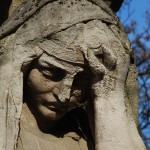Ancestral Roots: Part 1
 In October, I attended the 2nd Annual Earth Medicine Conference in San Francisco. At the conference I was reminded that by examining my ancestral roots, I can better understand myself and have more compassion and understanding for others. The conference deepened my understanding of indigenous wisdom and the power of cultural traditions.
In October, I attended the 2nd Annual Earth Medicine Conference in San Francisco. At the conference I was reminded that by examining my ancestral roots, I can better understand myself and have more compassion and understanding for others. The conference deepened my understanding of indigenous wisdom and the power of cultural traditions.
As an architect, I’ve studied indigenous architecture, but this conference was my introduction to the broader concept of indigenous wisdom. Similar to indigenous architecture, indigenous wisdom develops in small tribal communities. This wisdom arises out of the community’s relationship to life, their respect for the environment, and their relationship with their ancestors. For me, this notion of indigenous wisdom set the foundation to reflect upon and explore my own ancestral history and cultural traditions.
Because I’m the 3rd generation living in the US, I’m somewhat removed from my European roots, but I know that there is deep suffering and displacement on both sides of my family. My father’s grandfather sent his 5 sons to the US and Israel to escape WWII, while his daughters remained in Poland to care for their extended family and ultimately perish in the holocaust. My mother’s grandfather on the other hand, immigrated to the US from Sicily to establish an Italian import business and build a better life for himself, his wife and their 7 children.
When I was 22, I took a trip to Villabate, Sicily, where my mother’s grandparents lived and where my great grandmother’s bothers’ and sisters’ families still live today. At that time, I met over 50 living relatives over the course of 2 weeks who welcomed me into their homes and helped me reconnect with my Sicilian roots. When I was there something within me re-awakened. It was as if a cellular imprint or genetic code had been activated, and for the first time in my life I felt like I was home. Everything was familiar and easy to navigate, from interpersonal interactions and body language to the local diet and food preparation.
By learning more about my mother’s extended family and drawing out my family tree with the help of my Sicilian relatives, I deepened my connection with my extended family and developed a deep appreciation for the history and humanity of my maternal lineage.
I still have much to learn about my father’s side of the family. The stories are vague at best and I have yet to visit Warsaw and experience the land that holds the story of my father’s ancestors.
While many of us may not have a strong connection with our ancestors or a sense of place in this world, we all have the capacity to learn indigenous wisdom, become more conscious, and develop a good relationship with our environment. But before we can begin to understand others and restore our relationship to the earth, we must first develop an understanding of – and appreciation for – our own ancestral history.
Most of our ancestors have suffered at one time or another…. In order for us to live peacefully and coherently in this world, it is up to us to clear up the past both for ourselves and for our ancestors. We can do this through family research and ritual ceremony. Research helps us understand what happened to our ancestors and ritual helps us let go of their pain and suffering. Rituals are partly for us and partly for the spirits. For this reason, it is important to consider how we honor our ancestors and to ensure that the rituals we perform are effective and sincere.
Some of the ritual work that I did while attending the Earth Medicine Conference included working within the Dagara tradition to connect with the spirit of Water and release some of the deep suffering and sadness that I’ve carried forward on behalf of my ancestors. This was a powerful experience for me and it opened a portal to a new way of dealing with profound unexpressed sadness. I have deep gratitude to the ritual leaders Ukumbwa and Rebecca deGraw for creating a safe space to connect and release.
